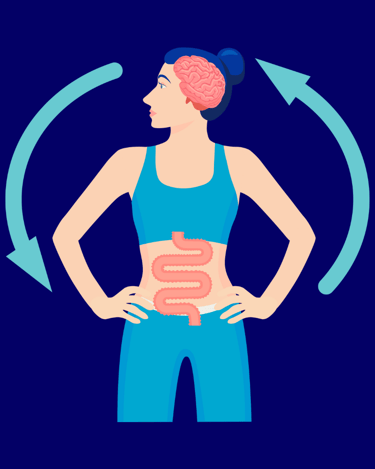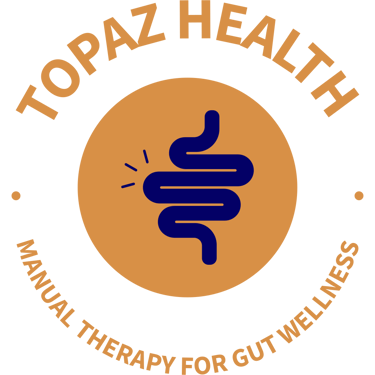
Understanding the Gut-Brain Axis
What is the Gut-Brain Axis, what affects it and how to improve it's function.
4/17/20254 min read
Exploring the Gut-Brain Axis: Its Impact on Your Health
The human body operates as a highly intricate system, where the communication between various organs is vital for maintaining harmony and good health. One such key communication network is the Gut-Brain Axis (GBA), which represents the two-way dialogue between the gut and the brain. This powerful connection influences various aspects of our health, from our emotional state to immune function and even our cognitive capabilities.
But what exactly does the Gut-Brain Axis entail? How does it affect our overall wellness? And what can we do to ensure it remains in optimal condition? Let's delve deeper.


What Is the Gut-Brain Axis?
The Gut-Brain Axis refers to the continuous, bidirectional communication between the brain and the gastrointestinal system. This connection is facilitated through a number of channels, including the vagus nerve, immune pathways, and various hormones. The gut is sometimes called the "second brain" because of the enteric nervous system (ENS), which contains its own complex network of neurons and allows the gut to operate independently to regulate digestion and influence emotions and well-being.
Home to trillions of microorganisms collectively known as the gut microbiota, the gut plays a central role in digestion, metabolism, and immune health. These microbes can also produce neurotransmitters like serotonin, often dubbed the "feel-good" hormone, that have a direct effect on the brain. Conversely, the brain can impact gut function, controlling aspects such as intestinal motility and immune responses, particularly through the Hypothalamic-Pituitary-Adrenal (HPA) axis, a vital system for managing stress.
How Does Dysfunction in the Gut-Brain Axis Manifest?
When the communication between the gut and the brain becomes disrupted, it can result in various symptoms that affect both physical health and mental well-being. Common signs of an imbalanced Gut-Brain Axis include:
Digestive Problems: Chronic bloating, excessive gas, constipation, diarrhoea, and acid reflux are common digestive disturbances. These symptoms can arise when the gut microbiota is disrupted or the gut-brain communication is impaired.
Mental Health Issues: Feelings of anxiety, depression, mood swings, and even brain fog can emerge when the gut and brain fail to communicate effectively. Since up to 90% of serotonin is produced in the gut, any disruption can have a significant impact on mental health.
Fatigue and Sleep Issues: Ongoing fatigue, sleep disturbances, and difficulty maintaining energy levels can be associated with gut-brain axis dysfunction. The health of the gut directly affects how the body processes nutrients and maintains energy.
Cravings and Eating Habits: An imbalance in gut bacteria may lead to cravings for sugary, high-fat, and processed foods. The gut microbiota plays a role in regulating appetite, which can influence food choices and eating behaviour.
Immune System Imbalance: As a significant portion of the body's immune system resides in the gut, any disruption in the GBA may lead to heightened inflammation, increased susceptibility to infections, autoimmune disorders, or allergies.
How to Restore Balance to the Gut-Brain Axis
Fortunately, there are several strategies supported by research that can help restore balance to the Gut-Brain Axis. Here are some of the most effective methods:
Dietary Changes: A varied and nutrient-dense diet can help improve the diversity of your gut microbiota, which in turn, may enhance brain health. Foods rich in omega-3 fatty acids, fermented foods, probiotics, and polyphenols can help support the gut, fostering better communication between the gut and brain. If you experience digestive issues, it might be worth consulting a naturopath for personalised advice.
Regular Exercise: Exercise has been shown to support gut health by encouraging the growth of beneficial bacteria. Physical activity also boosts the release of endorphins, which are known to improve mood and reduce stress.
Managing Stress: While stress is inevitable, chronic stress can disrupt both digestion and emotional well-being. Mindfulness techniques, such as meditation, yoga and diaphragmatic breathing exercises can help manage stress levels and promote better gut function, leading to improvements in mood.
Prioritise Sleep: Poor sleep or insufficient rest can have detrimental effects on both gut health and mental well-being. A consistent sleep routine, aiming for 7-9 hours of restorative sleep, is crucial for maintaining a healthy Gut-Brain Axis. Creating a relaxing pre-sleep routine, such as avoiding screens and high-energy activities, can aid better rest.
Stay Hydrated: Staying well-hydrated is essential for overall health and plays a key role in supporting gut function. Adequate fluid intake promotes proper digestion by helping nutrient absorption, smooth movement of food through the digestive tract, and the elimination of waste and pathogens. It also helps maintain a healthy balance of gut bacteria.
Consider Visceral Osteopathy: Visceral osteopathy focuses on the gentle manipulation of internal organs to improve their function. By addressing restrictions and tension in the digestive organs and surrounding tissues, this therapy can help alleviate common gut issues such as bloating and constipation. It also promotes relaxation, reduces stress and enhances vagus nerve activity, improving communication between the gut and brain.
Conclusion
The Gut-Brain Axis plays a significant role in regulating both our digestive health and our emotional and mental well-being. By understanding this connection and adopting strategies like improving our diet, managing stress, exercising regularly, and getting sufficient sleep, we can support a balanced Gut-Brain Axis and foster a healthier more harmonious life.
If you are experiencing symptoms related to an imbalanced GBA, it is a good idea to consult a healthcare professional for tailored advice. With the right knowledge and practices, it is possible to nurture a healthier Gut-Brain Axis and enhance your overall quality of life.
Contact
The Body Project
Level 4,6 Help Street
Chatswood
NSW, 2067
(02) 9884 8758
fiona@topazhealth.au
Quick Links
FAQs
Osteopathy for Gut Health
Osteopathy for TMJ
Fees
Resources
Copyright © 2024 | Topaz Health | Privacy Policy | ABN: 141 202 953 15


Blues Point Practice
117 Blues Point Road
North Sydney
NSW, 2060
0422713396
You Little Beauty
Shop 7, 33 Tramore Place
Killarney Heights
NSW, 2087
0422713396
